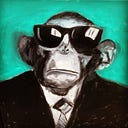The Nurse and the Navigator
Our grandparents are the only couple buried in Abraham Lincoln National Cemetery where both husband and wife are decorated war heroes.
The six gun salute ripping through the freezing rain the day their ashes were buried pierces the memory still. Tears flowed freely. I don’t recall Dad ever crying like that, sniffling, muffling his own sobbing, and channeling an inner child I never met until that afternoon. When stiff upper lips crumble, hearts follow.
Two American flags were folded. The others were whipping in the wind, violently, sirens to a violence prosecuted so that violence might end.
Dada won the Distinguished Flying Cross twice. It’s the highest honor the Air Force can confer. Nana was on the beaches of Normandy on Day 8, following the front lines through the liberation of Buchenwald and on to victory in Berlin. He was a decorated navigator on the pathfinding B-17 Flying Fortress in the mighty 8th. She was a surgical army trauma nurse.
The 900 love letters they exchanged on the European front during the Second World War now interlace Dad’s book, a story of their romance and the inseparable and interlaced story of the war. It took Dad ten years to stitch together their narrative. Their wartime love is now public record, conjured from a trunk in the basement like a genie uncorked.
That genie smirks, begging a few questions.
How many other love stories like it will never see the light of day?
Why did our grandparents survive when so many others died?
Who will tell the stories of those who did not, who never became parents and grandparents to the descendants who might tell their tales?
What can we possibly do now, in our time, to measure their courage, and to honor and protect the freedom they secured?
How we possibly live up to the standard set by the greatest generation?
There are three heroes in this story. The Nurse and the Navigator, for sure. And then the quieter act of heroism, that of a history teacher in the basement who opens a trunkful of letters and dedicates a decade of his life to their love.
His story of their story is now a love letter too. It’s a love letter to them, and a love letter that by definition their living eyes will never read. It’s probably too much to ask if somewhere their souls are smiling and awash with pride.
Could the parents of a historian see the future when they wrote and saved these letters? And if they couldn’t, how did my grandmother, not even a wife at the time, write the following words?
And a reason for tears tonight is one that can barely be understood now; it’s for a reason far into the future, one that I have no basis for yet; but I save your letters each one because they’ll be valuable someday to someone besides me.
Maybe everyone lives forever. Or maybe like in the animated movie Coco, only those whose stories get told by the living definitely do. It takes a story worth telling.
Though aren’t they all?
And it takes a storyteller.
Though aren’t we all?
My Dad said that in writing this book, he sometimes felt like a voyeur at his parents romance, like Marty McFly from Back to the Future. This is more like back from the past. When my dad finished the last letter, he told me he cried. I wasn’t there, but I did ask him why. His answer was heartbreaking, and something he could not have expected to do in life were it not for the letters in the trunk.
When I finished the last letter, I had to say goodbye to my parents for a second time.
Now the rest of the world can say hello.
